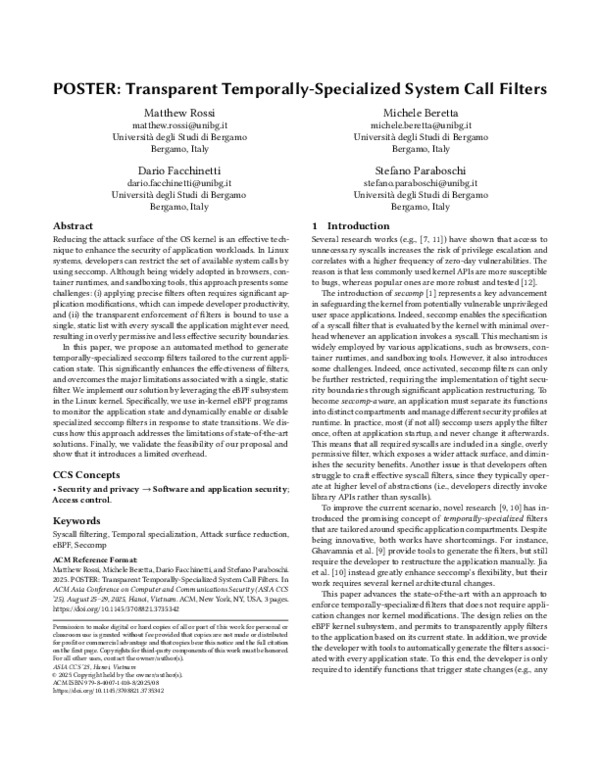POSTER: Transparent Temporally-Specialized System Call Filters
Matthew Rossi, Michele Beretta, Dario Facchinetti, Stefano Paraboschi
In Proc. of the 20th ACM ASIA Conference on Computer
and Communications Security (ASIACCS)
Hanoi, Vietnam, August 25-29, 2025
Reducing the attack surface of the OS kernel is an effective technique to enhance the security of application workloads. In Linux systems, developers can restrict the set of available system calls by using seccomp. Although being widely adopted in browsers, container runtimes, and sandboxing tools, this approach presents some challenges: (i) applying precise filters often requires significant application modifications, which can impede developer productivity, and (ii) the transparent enforcement of filters is bound to use a single, static list with every syscall the application might ever need, resulting in overly permissive and less effective security boundaries.
In this paper, we propose an automated method to generate temporally-specialized seccomp filters tailored to the current application state. This significantly enhances the effectiveness of filters, and overcomes the major limitations associated with a single, static filter. We implement our solution by leveraging the eBPF subsystem in the Linux kernel. Specifically, we use in-kernel eBPF programs to monitor the application state and dynamically enable or disable specialized seccomp filters in response to state transitions. We discuss how this approach addresses the limitations of state-of-the-art solutions. Finally, we validate the feasibility of our proposal and show that it introduces a limited overhead.
@inproceedings{poster-syscalls,
author = {Matthew Rossi and Michele Beretta and Dario Facchinetti and
Stefano Paraboschi},
booktitle = {Proceedings of the 20th ACM ASIA Conference on Computer
and Communications Security (ASIACCS)},
doi = {10.1145/3708821.3735342},
title = {POSTER:~Transparent Temporally-Specialized System Call Filters},
day = {25-29},
month = {August},
year = {2025},
location = {Hanoi, Vietnam},
}
